Hasty trial against Viasna continues: court reads case files at record speed
The trial over Viasna’s leadership continues in the Lieninski District court of Minsk. Among the defendants is Nobel Peace Prize 2022 laureate Ales Bialiatski. Unlike many other high-profile cases, the procedure is fast: hearings take place every day. The defendants, who have been in custody since July 14, 2021, have pleaded not guilty. Their interrogation will take place after studying the written materials of the case. Viasna tells what happened in court on January 17–19 and what new facts were revealed about the process.
Up to 8,000 pages a day: court examines files at record speed
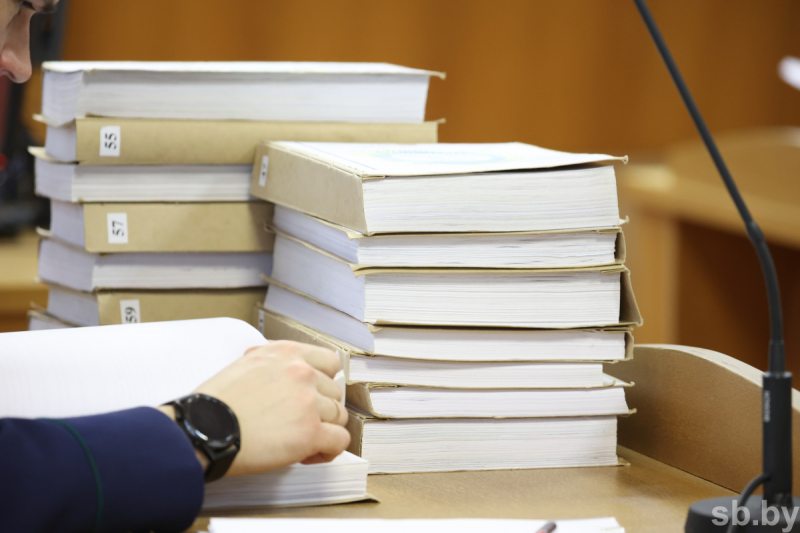
- Written materials on the Viasna case contain 85,000 pages.
This week, the court continues to read out the case materials—there are 283 volumes of 300 pages each. Surprisingly, one-fifth of them, 60 volumes, has been already made through. At the first sittings 18 volumes were read out; at the eighth sitting, on January 17, 27 volumes were read out, while on January 18 and 19, 15 volumes of the criminal case were studied.
On January 19, the court examined information from data storage devices seized from Uladzimir Labkovich during searches and his messengers’ history. In addition, on the same day, another report of the interrogation of Viasna human rights defender Alena Laptsionak was read. She was arrested together with other Viasna activists on July 14, 2021, and released later. One of the reports of Laptsionak's questioning has already been read at the second court session on the Viasna case.
Valiantsin Stefanovic: “I will never give up”
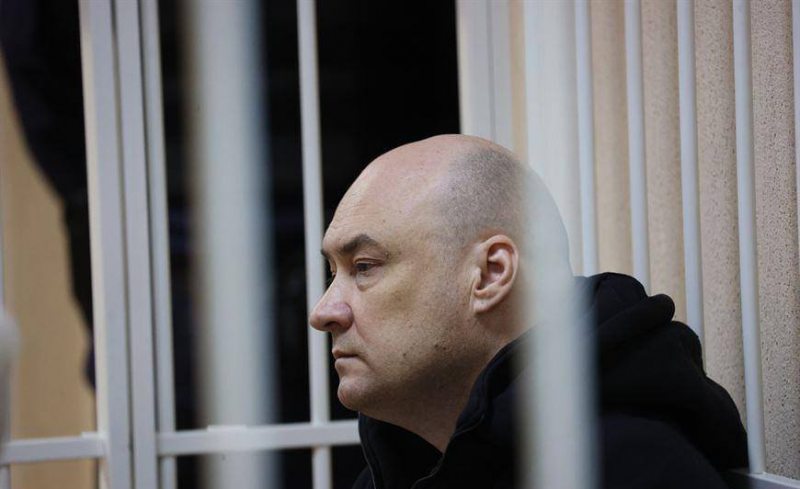
In a recent letter, Valiantsin Stefanovich points out that the trial seems to be artificially sped up, and apparently it was not the decision of the judge. He briefly comments on the process:
“I feel very strong now. I will never give up. I am not afraid of them. I believe that soon we will all see each other and hug each other.”
Process spectator: Prosecution evidence is questionable
A spectator who attended the hearings says:
“Accusations against human rights defenders are based on confiscated documents in the form of receipts, bank statements on the movement of funds, contracts for work and re-contracting, project applications, witness testimony, and correspondence in messengers extracts. The "quality" of the evidence presented by the state prosecutor is occasionally questioned by both the lawyers and the defendants themselves. Lawyers have drawn attention that a number of documents do not contain an official translation into the language of the criminal proceedings. The state prosecutor has answered that in the next volumes of the criminal case, the certified official translation will be provided and read out.
Ales Bialiatski is active in his own defense. The Viasna chairman points out that a large number of confiscated contracts with Pavasaris lack the signature of the second party, the director, and from the accounting point of view, such documents are null and void. Bialiatski draws attention to the fact that a number of documents belong to the period which is not imputed to them under the article on the financing of group actions that grossly violate public order.”
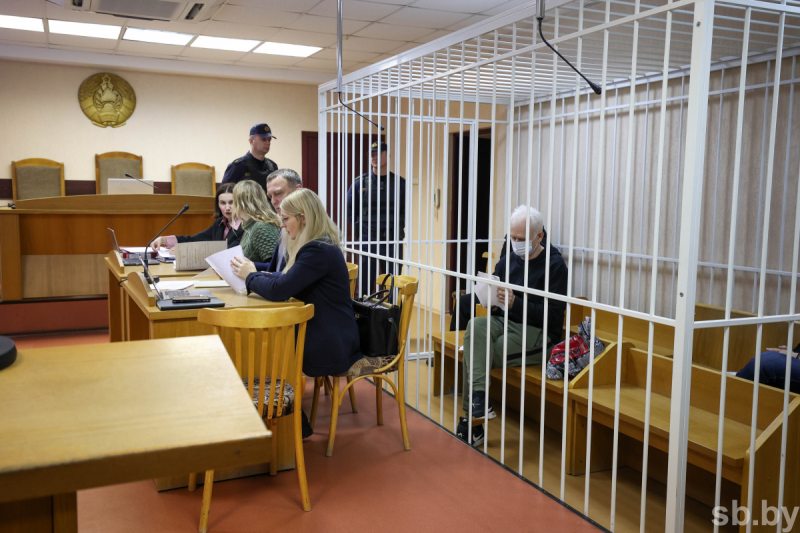
Viasna trial through the eyes of a spectator: Prosecution evidence is questionable and security measures unprecedented
The court discouraged witnesses from appearing in person
About 100 witnesses were questioned in the Viasna case during the investigation, but only a few people were summoned to the court: Narodnaya volya and SNplus chief editors, customs officers, and several human rights defenders from the regions. The testimonies of several more human rights activists, the chief editor of Novy Chas, and two witnesses with changed surnames were read out.
The other witnesses requested consideration without their presence and did not appear at the trial. Among the reasons, they have mentioned a lack of funds for travel, the need to care for minor children, and poor health. The human rights defenders’ lawyers objected that the stated reasons do not preclude the presence of the witnesses. The defense noted that the statements looked like carbon copies, and oddly enough, most witnesses mention insufficient travel funds, even though they were all in Belarus and could travel on a budget. The witnesses also did not provide any documents confirming their poor health. They argued that their absence deprives the accused of the right to defense because they have no opportunity to ask additional questions. But despite the lawyers' objections, the court found the reasons for the non-appearance of witnesses valid and decided to read their testimony given during the investigation. One of the lawyers noted that the witnesses could be obliged to attend the trial. But despite the lawyers' objections, the court found the reasons for the non-appearance of witnesses valid and decided to read their testimony given during the investigation.
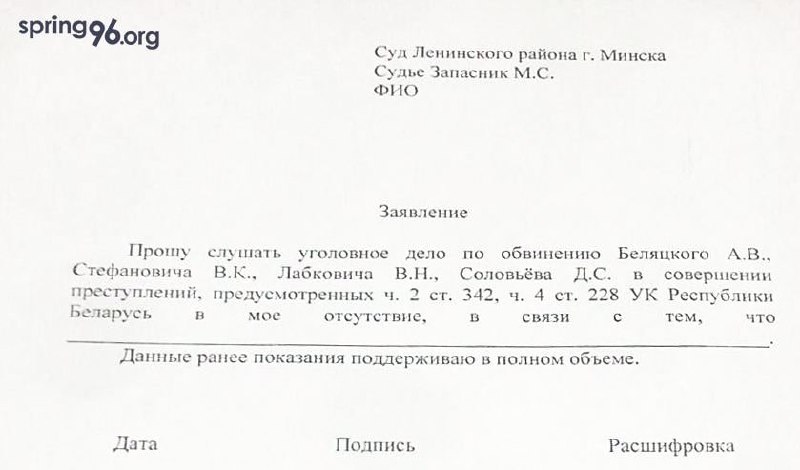
Later it turned out that the witnesses had indeed received a template of a non-appearance request. The human rights activists were given a document that the court sent to the witnesses. This document contains a pre-filled request to hear the criminal case in the absence of the witness because this person "fully supports the testimony given earlier”. What this shows is that the court was not initially interested in questioning witnesses in the Viasna case. The reason might be to prevent human rights defenders and their defenders from asking clarifying questions and thereby revealing contradictions in the testimony.
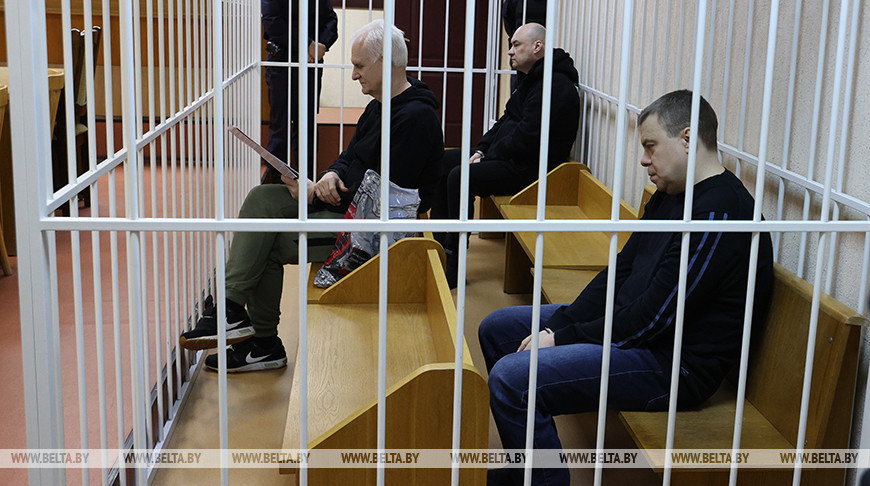
Viasna members on trial: A day-by-day chronology of the court

















